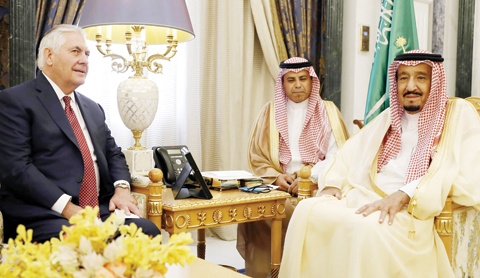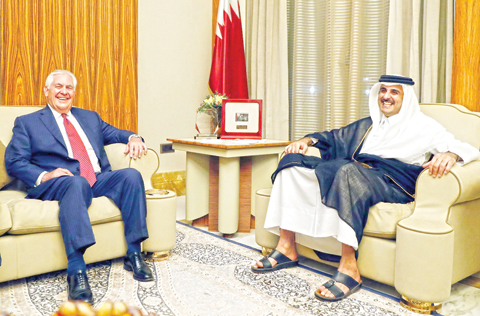Top US diplomat demands Iran militias leave Iraq - Riyadh, Baghdad pledge cooperation

RIYADH: US Secretary of State Rex Tillerson is received by Saudi King Salman bin Abdulaziz Al-Saud in the Saudi capital yesterday. - AFP
RIYADH/DOHA: Top US diplomat Rex Tillerson pursued efforts to curb Tehran's influence in talks with his country's Gulf allies yesterday, demanding that Iran pare down its involvement in Iraq as the fight against the Islamic State group draws to a close. The question of Iranian influence in the region - including in Iraq and Qatar - is at the center of Tillerson's visit to Riyadh and Doha, which comes just weeks after President Donald Trump refused to certify the Iran nuclear deal and declared an aggressive new strategy against Tehran.
The US secretary of state appears focused on boosting Sunni-ruled Saudi Arabia's clout in Iraq, where Shiite forces backed by Tehran are fighting in the north, as part of a wider regional battle for influence that extends from Syria to Yemen. "Certainly Iranian militias that are in Iraq, now that the fighting against (the Islamic State group) is coming to a close, those militias need to go home," Tillerson said at a press conference in Riyadh. "All foreign fighters need to go home."

DOHA: Qatari Emir Sheikh Tamim bin Hamad Al-Thani meets Tillerson at the Prince's Sea Palace residence in the Qatari capital yesterday. - AFP
The Popular Mobilisation Forces (PMF) - powerful paramilitary units dominated by Iranian-trained Shiite militias - have been part of the fight against IS and continue to battle different factions in Iraq. But Tillerson's remarks were also aimed at Iran's elite Revolutionary Guards (IRGC) and their foreign operations wing, the Quds Force, according to a senior US official. "The position of the Iraqi government and the position of our government is that there should be a single Iraqi security force answerable to the Iraqi state," the official said on condition of anonymity. "What happens to the PMFs is they go home or they integrate into the Iraqi security forces."
Tillerson sat in on the first meeting of a joint Saudi-Iraqi coordination council in Riyadh yesterday, which Iraqi Prime Minister Haider Al-Abadi hailed as an "important step toward enhancing relations". Saudi Arabia cut ties with Iraq in 1990 following Saddam Hussein's invasion of Kuwait, but Riyadh and Baghdad have rekindled diplomatic and commercial relations this year.
Tillerson told the Saudi king and Abadi that the event highlighted the improving ties between the longtime rivals and showed "the great potential" for further cooperation. He noted the August reopening of a major border crossing and the resumption of direct flights between Riyadh and Baghdad. "Both represent the beginning of what we hope will be a series of even more tangible actions to improve relations and strengthen cooperation on a host of issues," he said. "Your growing relationship between the kingdom and Iraq is vital to bolstering our collective security and prosperity and we take great interest in it."
History, religion and lots of politics stand in Tillerson's way, but both the Saudi king and the Iraqi prime minister appeared optimistic about the prospects. "We are facing in our region serious challenges in the form of extremism, terrorism as well as attempts to destabilize our countries," King Salman said. "These attempts require our full attention. ... We reaffirm our support for the unity and stability of our brother country of Iraq." Abadi expressed pleasure with "the thriving relations between our two brotherly countries". "We are open and we want to move away from the past," he said. "The region cannot tolerate any further divisions. Interference in the internal affairs of other state should stop."
Tillerson's visit, his third to the region as secretary of state, comes nearly five months after Saudi Arabia, Bahrain, the United Arab Emirates and Egypt cut ties with Qatar and imposed an embargo on Doha, accusing it of supporting terrorism and cozying up to Iran. Qatar denies the charges and has rejected their terms for a settlement. Tillerson, a former chief executive of energy giant ExxonMobil, declined to take sides in the Gulf crisis, after an unsuccessful attempt to resolve the dispute during a trip to the region in July.
"The United States maintains very strong relationships with all the countries involved in the Qatar dispute, including Qatar, and the United States intends to maintain those very strong, positive important relationships," Tillerson said in Riyadh. "They're important from a security standpoint. They're important from an economic standpoint."
Trump had initially appeared to support Saudi Arabia in isolating Qatar but has since called for mediation, predicting a rapid end to the crisis. Tillerson however indicated there had been little progress before he arrived at Riyadh's King Salman airbase on Saturday. "I do not have a lot of expectations for it being resolved anytime soon," he said in an interview with financial news agency Bloomberg. "There seems to be a real unwillingness on the part of some of the parties to want to engage."
The State Department has said the conflict in Yemen, where Saudi Arabia and Iran back warring parties, will also figure in Tillerson's talks in the Gulf. But on the Qatar crisis, Tillerson's goal will be to try to persuade the two sides to at least open a dialogue. Simon Henderson, a veteran of the region now at the Washington Institute of Near East Policy, said the disputing parties do not want to lose face. "Tillerson will say: 'Come on kids, grow up and wind down your absurd demands. And let's work on a compromise on your basic differences'," he said.
Kuwait has tried to serve as a mediator, with US support, but the parties have yet to sit down face-to-face. During his trip Tillerson is also to visit New Delhi in order to build what he said in a recent speech could be a 100-year "strategic partnership" with India. Tillerson will stop in Islamabad to try to sooth Pakistani fears about this Indian outreach, but also pressure the government to crack down harder on Islamist militant groups. - Agencies










